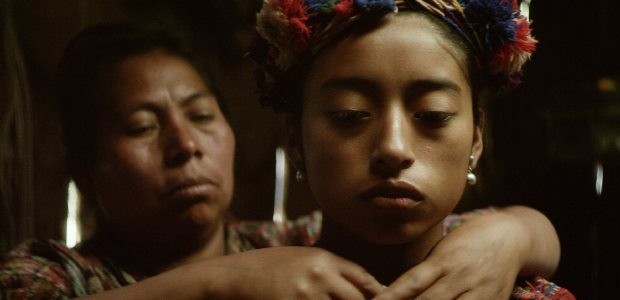Ixcanul is a movie from Guatemala, a Central American country to the south of Mexico. The title means Volcano in the Mayan dialect K’iche, and is about a rural family that lives on a coffee plantation in the shadow of a volcano. As a rare movie from the nation to travel beyond its borders and even make waves at film festivals (it won a Silver Bear at Berlin), Ixcanul is a proficiently made film by a predominantly local crew and cast most of whom make their feature film debut – including the director, cinematographer and the principal actors. Given all that, this is a surprisingly well-directed, shot and performed film, depicting the lives of a less-known people with sincerity and sensitivity.
Maria (Maria Mercedes Coroy) is a young girl who works with her robust mother (Maria Telon) and unflustered father (Manuel Antun) at the coffee plantation, looking after the crops as well as tending to the farm animals. When Maria is betrothed to the widower plantation owner, she seeks to run away with a boy her age. Abandoned by the scoundrel and with the crops infested by snakes, Maria and her family must cope with the struggles of life.
The movie does well to observe the life as lived by the Mayan family, depicting many of their customs, rituals and beliefs as a part of the narrative. Ixcanul does well to breathe life into the family and its predicaments. Much credit for this must be attributed to the actress Maria Telon playing the mother. She is animated and commanding at times, and equally vulnerable and caring when required. As it progresses, she becomes the tour-de-force of the movie, her character holding her family within the film and the actress holding the audience outside. Unfortunately, it struggles with symbolism – there are any number of ways the volcano can be thought of being symbolic to the film. A few stylistic choices are also off-key. In one scene, the characters are deliberately made to run an unwarranted distance with a shaky-cam effect to enhance the tension.
Ixcanul is Guatemala’s first ever official entry at the Academy Awards for Best Foreign Language Film, which is a huge achievement for the country’s film industry. And while the movie may not carry the distinctions for winning that trophy, it is an impressive debut feature for all involved, especially Maria Telon and Director Jayro Bustamante, and makes for an absorbing watch.
Rating: 




